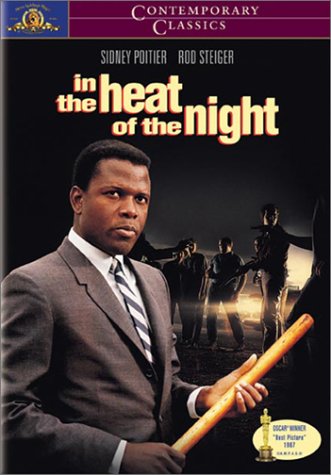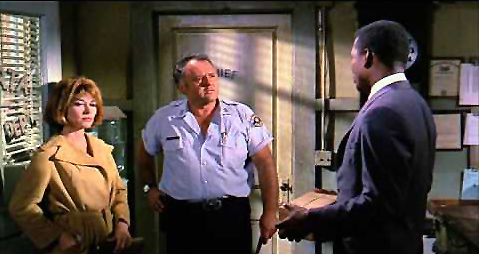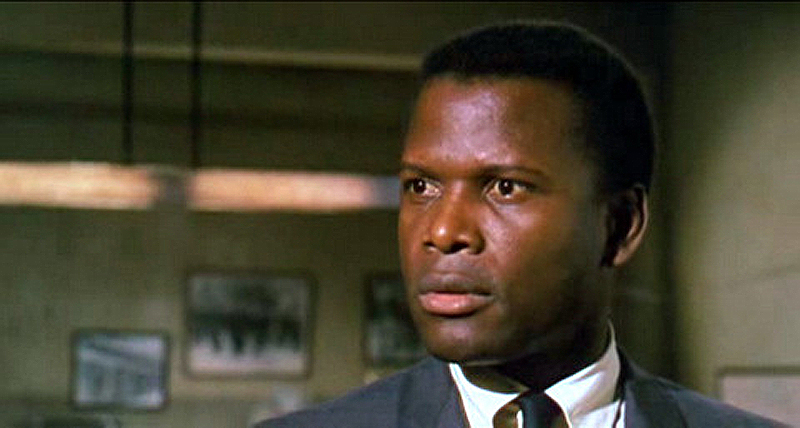Joyce Glasser reviews In the Heat of the Night – re-release (November 18, 2016)
For cinephiles and anyone over 50 In the Heat of the Night, re-released this week with a stunning new print, needs little introduction. Nominated for seven Academy Awards in 1967, it received a staggering five big ones: Best Picture (Producer Walter Mirisch), Best Actor (Rod Steiger), Best Screenplay (Stirling Silliphant, The Towering Inferno and The Poseidon Adventure), Best Sound, and Best Film Editing (Hal Ashby – who went on to direct Harold and Maude, Shampoo, Coming Home and Being There). The music is by Quincy Jones and the title song sung by Ray Charles.
 But pedigree aside, what is most memorable about the film is the caustic interaction between the hostile, bigoted small town population, their ignorant and resentful police force and Virgil Tibbs (Sidney Poitier), the well-educated, brilliant, black, big city detective ‘dressed in white man’s clothes’. And what turns a good film into a great one is the tense testing of one another and faint hints of bonding between Rod Steiger’s haughty, bigoted, but vulnerable and essentially decent, police chief, and Poitier’s sophisticated supercop, who responds with a quiet contempt and cautious distrust of his counterpart. Throughout the film, this handsome, expensive suit that Tibbs wears like armour, gets a bit soiled, but never looks wrinkled.
But pedigree aside, what is most memorable about the film is the caustic interaction between the hostile, bigoted small town population, their ignorant and resentful police force and Virgil Tibbs (Sidney Poitier), the well-educated, brilliant, black, big city detective ‘dressed in white man’s clothes’. And what turns a good film into a great one is the tense testing of one another and faint hints of bonding between Rod Steiger’s haughty, bigoted, but vulnerable and essentially decent, police chief, and Poitier’s sophisticated supercop, who responds with a quiet contempt and cautious distrust of his counterpart. Throughout the film, this handsome, expensive suit that Tibbs wears like armour, gets a bit soiled, but never looks wrinkled.
Released less than a year before the assassination of Martin Luther King, the film is a snapshot of race relations in the American South at the time. Sergeant Sam Wood (Warren Oats) is on patrol on hot summer night when he finds the body of a liberal white industrialist, Mr Colbert. Colbert was planning to invest in an integrated factory near Sparta. Opinions might be divided but unemployment is high and even the racist mayor considered Mr Colbert the most important man in the town.
Sparta Police Chief Bill Gillespie (Rod Steiger), attacking a piece of gum with a vengeance, orders Wood to search the roads for a hitchhiker and the train station. A handsome, well groomed and immaculately dressed black man with a suitcase is waiting for the 4:10am train to Philadelphia via Memphis, when Wood arrests him, addressing him as ‘boy.’ After being mocked, bullied and accused of stealing from the deceased because he has $100 in his wallet, Tibbs displays his police badge. Gillespie, surprised and embarrassed, is momentarily humbled.
After speaking with Tibbs’s supervisor in Philadelphia, Gillespie asks a reluctant Tibbs to help solve the murder. Within no time Tibbs determines the time of death is much earlier than the coroner’s estimate and that the body had been moved to the spot where Wood found him. No one knows what to make of this brilliant detective who earns the support of the deceased’s widow (Lee Grant), frustrated at the ineptitude of the investigation. He also earns the gratitude of two innocent suspects whom he clears of any involvement after Gillespie has thrown each, in turn, into jail.
 Surrounded by the bigotry of the population and the jealousy and resentment of Sparta’s white police officers, Tibbs is nearly killed for standing up to a racist suspect, Eric Endicott (Larry Gates) and a mob of red-neck, low-lives who resent his interference. In the Heat of the Night is, of course, much more than a potent message about bigotry. While the mystery (Silliphant’s script is based on a largely forgotten book by John Ball) is, in places, a bit dodgy and underwritten, the film is nonetheless a solid forensic who-dunit, peopled with a colourful array of low-life characters, each one a individual, albeit superficially sketched. The focus is on the complex characters of Tibbs and Gillespie. Silliphant includes in the mystery a clever red-herring that evolves out of Tibbs’s own prejudice against a wealthy, racist suspect. When Gillespie accuses Tibbs of ‘being just like us,’ he is referring to more than his determination to get his man at any cost.
Surrounded by the bigotry of the population and the jealousy and resentment of Sparta’s white police officers, Tibbs is nearly killed for standing up to a racist suspect, Eric Endicott (Larry Gates) and a mob of red-neck, low-lives who resent his interference. In the Heat of the Night is, of course, much more than a potent message about bigotry. While the mystery (Silliphant’s script is based on a largely forgotten book by John Ball) is, in places, a bit dodgy and underwritten, the film is nonetheless a solid forensic who-dunit, peopled with a colourful array of low-life characters, each one a individual, albeit superficially sketched. The focus is on the complex characters of Tibbs and Gillespie. Silliphant includes in the mystery a clever red-herring that evolves out of Tibbs’s own prejudice against a wealthy, racist suspect. When Gillespie accuses Tibbs of ‘being just like us,’ he is referring to more than his determination to get his man at any cost.
With its focus on meticulous investigating, forensics and psychological as well as physical evidence, In the Heat of the Night is not only a precursor of television dramas from NYPD Blue, Cold Case Files, CSI and NCIS, but of a swarm of films for cinema. Tibbs has such superior intelligence and uncanny instincts that comparisons with Sherlock Holmes and Columbo are apt. And along with that comes the fun of watching Tibbs impress the locals with his ability to trace a piece of the osmunda plant he finds in the deceased’s car with Endicott’s orchid collection.
In the Heat of the Night is also an early example of the cop buddy movie. Here, however, the respect Gillespie begins to feel for Tibbs and the empathy Tibbs feels for Gillespie, is made all the more satisfying for being so gradual and so subtly expressed. Gillespie shrewdly sees through Tibb’s motivation for risking his life in Sparta. He knows that Tibbs cannot resist the opportunity to prove himself in such a racially hostile environment. But Gillespie, too, reveals something about himself, and of the deep-seated nature of prejudice, in a spell-binding scene at the end of the film.
When it’s clear Tibbs is not safe on the streets, Gillespie invites him to his house, the only man to have had the honour. When Tibbs declines a drink, Gillespie voluntarily justifies his drinking, as though ashamed of this weakness. ‘I got no wife and I got no kids and I got a town that don’t want me. I got an air conditioner that I got to oil and I got this place (his depressing house).’ As our sympathy for Gillespie mounts, he asks the unmarried Tibbs, ‘don’t you get a bit lonely?’ When Tibb’s answers, ‘no lonelier than you,’ Gillespie snaps out of his confessional mode, referring to his guest as ‘black boy’. Tibbs is taken aback and remains silent before leaving. Gillespie has reacted with an inherent fear, not only of getting close to Tibbs, but of his realisation that they might be more alike that he cares to admit.
You can watch the film trailer here:




